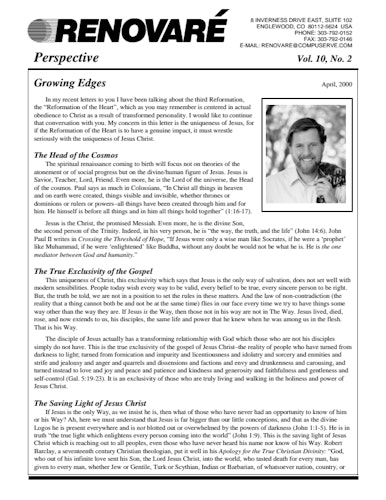In my recent letters to you I have been talking about the third Reformation, the “Reformation of the Heart”, which as you may remember is centered in actual obedience to Christ as a result of transformed personality. I would like to continue that conversation with you. My concern in this letter is the uniqueness of Jesus, for if the Reformation of the Heart is to have a genuine impact, it must wrestle seriously with the uniqueness of Jesus Christ.
The Head of the Cosmos
The spiritual renaissance coming to birth will focus not on theories of the atonement or of social progress but on the divine/human figure of Jesus. Jesus is Savior, Teacher, Lord, Friend. Even more, he is the Lord of the universe, the Head of the cosmos. Paul says as much in Colossians, “In Christ all things in heaven and on earth were created, things visible and invisible, whether thrones or dominions or rulers or powers all things have been created through him and for him. He himself is before all things and in him all things hold together” (1:16 – 17).
Jesus is the Christ, the promised Messiah. Even more, he is the divine Son, the second person of the Trinity. Indeed, in his very person, he is “the way, the truth, and the life” (John 14:6). John Paul II writes in Crossing the Threshold of Hope, “If Jesus were only a wise man like Socrates, if he were a ‘prophet’ like Muhammad, if he were ‘enlightened’ like Buddha, without any doubt he would not be what he is. He is the one mediator between God and humanity.”
The True Exclusivity of the Gospel
This uniqueness of Christ, this exclusivity which says that Jesus is the only way of salvation, does not set well with modern sensibilities. People today wish every way to be valid, every belief to be true, every sincere person to be right. But, the truth be told, we are not in a position to set the rules in these matters. And the law of non-contradiction (the reality that a thing cannot both be and not be at the same time) flies in our face every time we try to have things some way other than the way they are. If Jesus is the Way, then those not in his way are not in The Way. Jesus lived, died, rose, and now extends to us, his disciples, the same life and power that he knew when he was among us in the flesh. That is his Way.
The disciple of Jesus actually has a transforming relationship with God which those who are not his disciples simply do not have. This is the true exclusivity of the gospel of Jesus Christ — the reality of people who have turned from darkness to light; turned from fornication and impurity and licentiousness and idolatry and sorcery and enmities and strife and jealousy and anger and quarrels and dissensions and factions and envy and drunkenness and carousing, and turned instead to love and joy and peace and patience and kindness and generosity and faithfulness and gentleness and self-control (Gal. 5:19 – 23). It is an exclusivity of those who are truly living and walking in the holiness and power of Jesus Christ.
The Saving Light of Jesus Christ
If Jesus is the only Way, as we insist he is, then what of those who have never had an opportunity to know of him or his Way? Ah, here we must understand that Jesus is far bigger than our little conceptions, and that as the divine Logos he is present everywhere and is not blotted out or overwhelmed by the powers of darkness (John 1:1 – 5). He is in truth “the true light which enlightens every person coming into the world” (John 1:9). This is the saving light of Jesus Christ which is reaching out to all peoples, even those who have never heard his name nor know of his Way. Robert Barclay, a seventeenth century Christian theologian, put it well in his Apology for the True Christian Divinity: “God, who out of his infinite love sent his Son, the Lord Jesus Christ, into the world, who tasted death for every man, has given to every man, whether Jew or Gentile, Turk or Scythian, Indian or Barbarian, of whatsoever nation, country, or place, a certain day or time of visitation; during which day or time it is possible for them to be saved, and to partake of the fruit of Christ’s death.”
This is not universalism, which claims that all people will eventually be saved. No, this is the conviction that Jesus has been and is still reaching out to all peoples in ways we do not fully understand, extending to them the opportunity and the choice to turn toward the Light of Christ. Christ, the true Light, was reaching out to Socrates and millions more in the ancient world, and he is reaching out today even to those who have never heard his name. This is why C. S. Lewis in The Last Battle had one of the Calormen enter into the true heavenly Narnia. It is also why John Paul II in his 1990 encyclical Redemptoris Missio clearly states that whoever is saved is saved only through Jesus Christ, whether they have heard of him or not.
Originally published in Perspective, April 15, 2000.
Text First Published April 2000



